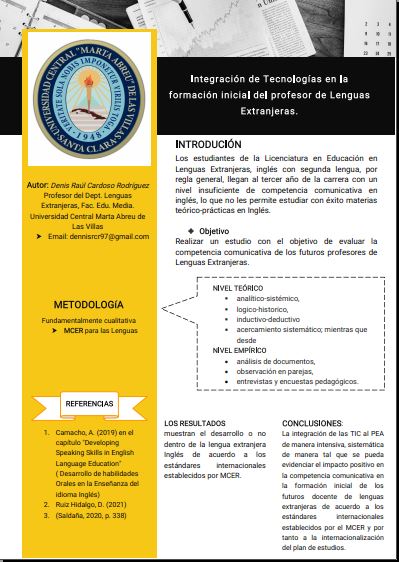Executive Secretary

III International Scientific Conference "Challenges of Education 2023"
V INTERNATIONAL SCIENTIFIC METHODOLOGICAL WORKSHOP. “DOCTORAL TRAINING IN EDUCATIONAL SCIENCES. CHALLENGES AND PERSPECTIVES”

Abstract
Problematic situation: Students of the Bachelor of Education in Foreign Languages, English with a second language, as a general rule, arrive at the third year of the degree with an insufficient level of communicative competence in English, which does not allow them to successfully study theoretical subjects practices in English.
Objective: To carry out a study with the objective of evaluating the communicative competence of future Foreign Language teachers.
Methodology: A predominantly quantitative methodology is followed with the use from the theoretical level of several methods such as analytical-systemic, logical-historical, inductive-deductive and systematic approach; while from the empirical level, document analysis, observation in pairs, interviews and pedagogical surveys were used, which allow us to know the level achieved. Indicators from the Common European Framework of Reference for Languages are used, adapted to the context.
Results and discussion: The results show the development or not within the foreign language English according to the international standards established by CEFR.
Conclusions: The integration of ICT into the PEA in an intensive, systematic manner so that the positive impact on communicative competence can be evidenced in the initial training of future foreign language teachers according to the international standards established by the CEFR and therefore to the internationalization of the curriculum.
Resumen
Problemática: Los estudiantes de la Licenciatura en Educación en Lenguas Extranjeras, inglés con segunda lengua, por regla general, llegan al tercer año de la carrera con un nivel insuficiente de competencia comunicativa en inglés, lo que no les permite estudiar con éxito materias teórico-prácticas en Inglés.
Objetivo(s): Realizar un estudio con el objetivo de evaluar la competencia comunicativa de los futuros profesores de Lenguas Extranjeras.
Metodología: Se sigue una metodología predominantemente cuantitativa con la utilización desde el nivel teórico de varios métodos como el analítico-sistémico, logico-historico, inductivo-deductivo y acercamiento sistemático; mientras que desde el nivel empírico se empleó el análisis de documentos, Observaciónen parejas, entrevistas y Encuestas pedagógicos, que permiten conocer el nivel alcanzado. Se utilizan indicadores del Marco Común Europeo de Referencia para las Lenguas, adaptados al contexto.
Resultados y discusión: Los resultados muestran el desarrollo o no dentro de la lengua extranjera Inglés de acuerdo a los estándares internacionales establecidos por MCER.
Conclusiones: La integración de las TIC al PEA de manera intensiva, sistemática de manera tal que se pueda evidenciar el impacto positivo en la competencia comunicativa en la formación inicial de los futuros docente de lenguas extranjeras de acuerdo a los estándares internacionales establecidos por el MCER y por tanto a la internacionalización del plan de estudios.
About The Speaker

Denis R. Cardoso Rodríguez

Discussion
